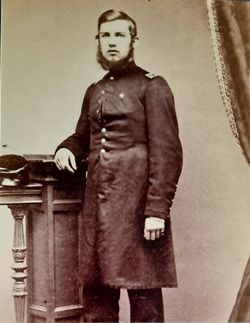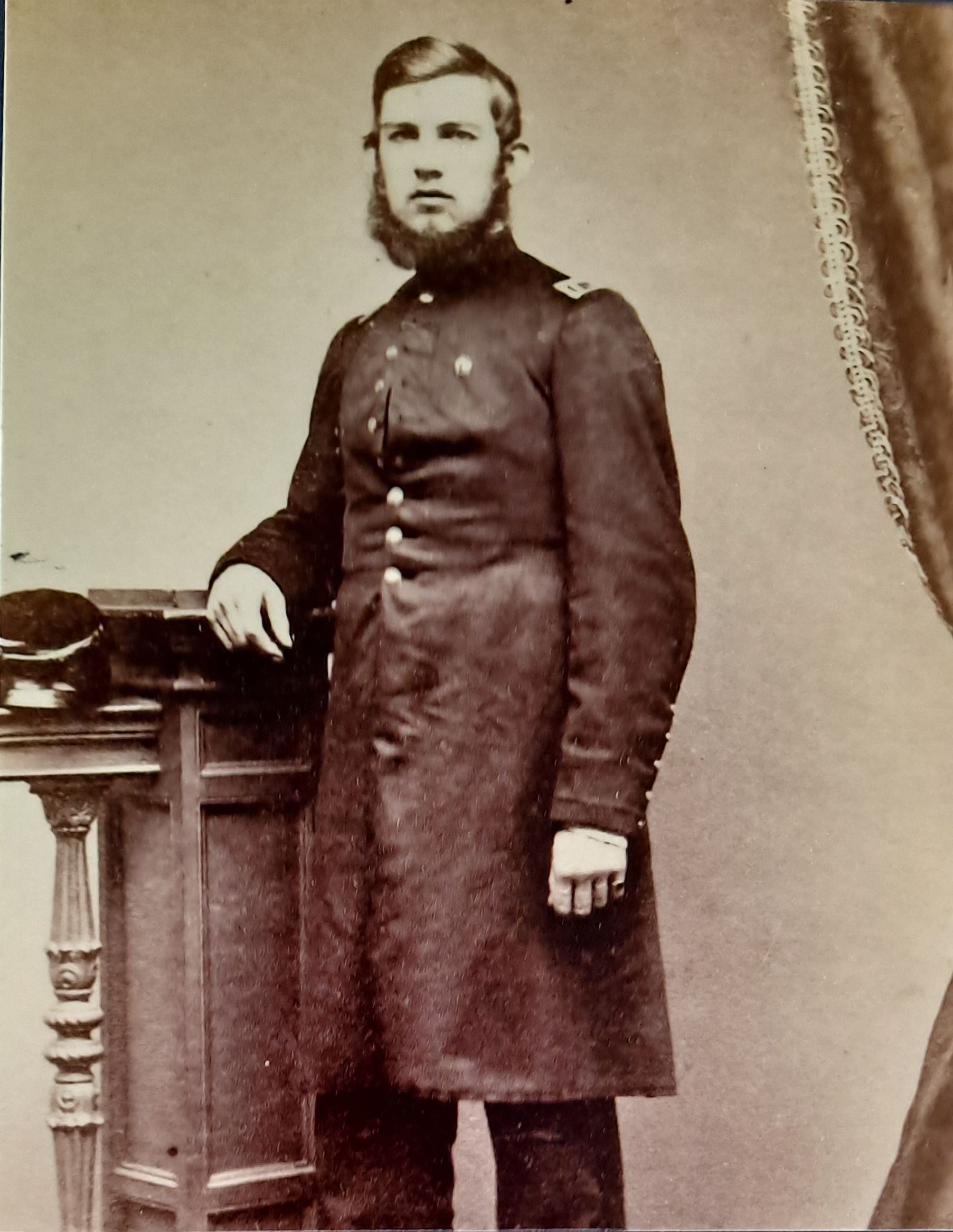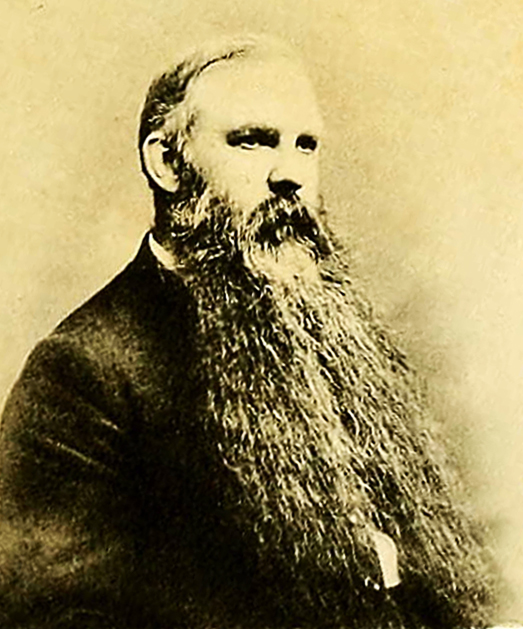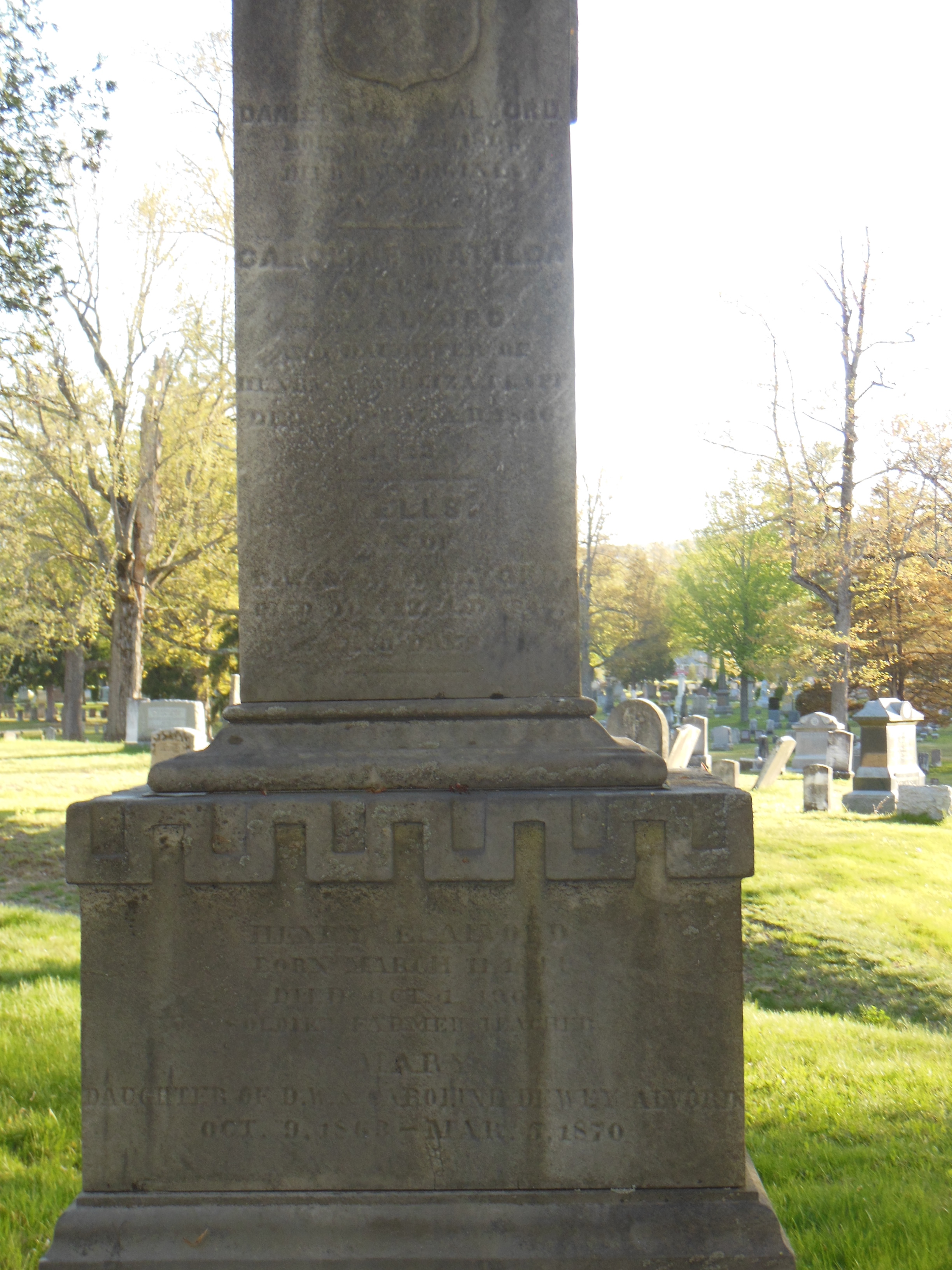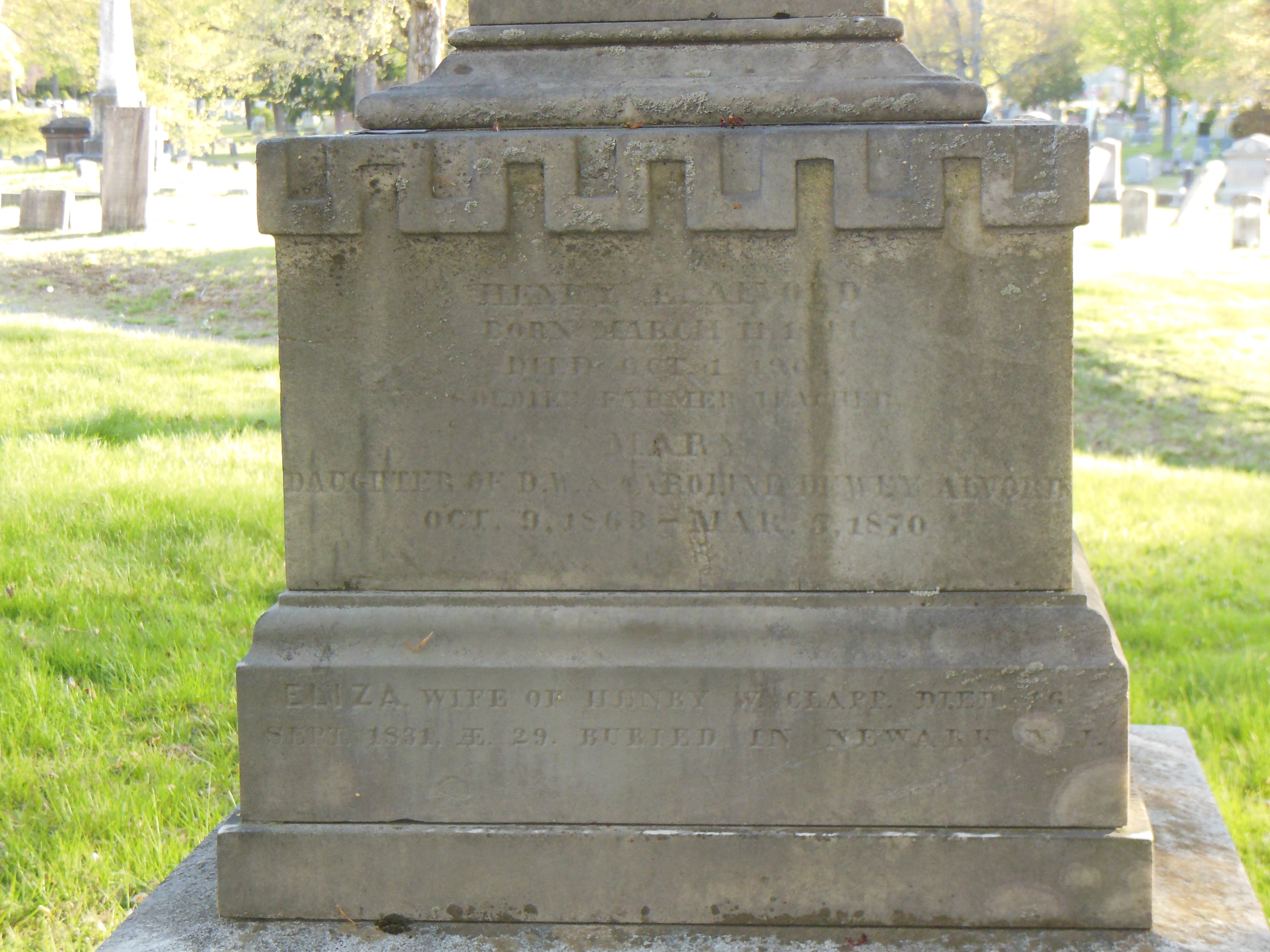--------------------------
Information from Pam Thompson;
Henry E. Alvord
Born March 11, 1844
Died Oct. 1, 1904
Soldier Farmer Teacher
Mary
Daughter of D.W. [Daniel Wells Alvord, brother of Henry Elijah Alvord] & Caroline Dewey Alvord
Oct. 9, 1863 – Mar. 5, 1870
Eliza, Wife of Henry W. Clapp, Died
Sept. 6, 1831, AE 20, Buried in Newark, N.J.
------------------------------------------------------
Obituary from the Greenfield Mass. Gazette and Courier Saturday October 8, 1904 page 1
--------------------------
AN HONORED SON OF GREENFIELD
Death of Maj. Henry E. Alvord and Soldier, Agricultural Specialist, and Indian Administrator.
The death of Maj. Henry Elijah Alvord, the chief of the Dairy Division of the Union Station Department of Agriculture, removes one of God's most distinguished sons, and one who had a most interesting and unusual career. His large services to the causes of scientific agricultural are well-known and will bear repeated emphasis. It is perhaps so not generally realized that Maj. Alvord did very important work on the Western plains during the period after the close of the Civil war, where he was a Chaplin in the regular army, and was doing garrison duty in the territory now western Kansas, Oklahoma and Northern Texas. The army offices in those days had large Indian responsibilities in there control who were on the verge of outbreak much of the time.
Maj. Alvord did not take the view that the "only good Indian is a dead one" He was remarkably successful in his dealings with with them, and he had a great deal to do with planning the Carlisle institution for race, which has been so large a factor in dealing with this problem.During the period when he was at the Houghton farm in Orange county, New York, he had a number of Indian boys and girls from Carlisle working under him.
Maj. Alvord established Fort Rilay and Fort Sill during his stay in the Western country, and did much other pioneer work, including the building of some of the first bridges over the streams.
A picturesque incident of this part of Maj. Alvord's career took place when he piloted a party of Indian chiefs to Washington to meet the Great Father for negotiations over an ??????????? disposition, and declared that when he returned he would again make war on the pale faces. Hw did not believe the white men were as numerous as had been represented. He set out to count the houses. This he found to be an impossible task, and he then counted only the camps or towns. When he got to St. Louis he went crazy at the revelation of the white man's power that had drawned on him.
Maj. Alvord was born in Greenfield on March 11, 1884, in a house then standing where Miss Elizabeth Leonard's house now stands. His father was Hon. Daniel Alvord, and his mother was the daughter of Henry Wells Clapp. He attended the public schools in Greenfield, graduating at
the High school, and attended the Norwich Military university in Vermont. The war broke out when he was in his fourth year, and he joined the so-called "student regiment" raised by Gov. Sprague of Rhode Island among college men. This regiment served 90 days and then Maj. Alvord re-enlisted in the 21 Massachusetts Calvary. Meanwhile the Norwich university had give him the degree of B. S., and at a later period in his life conferred upon him the degree of C. E. (Civil Engineer).)
Maj. Alvord saw hot campaigning, going all through the oenisular tighting and taking part in all Sheridan's battles. He was never wounded. Col. Charles Russell Lowell died in his arms and he brought him home. He retired in 1866 with the rank of Major, and spent some time in charge of the Freedmen's bureau at Alexandia, Va.
Maj. Alvord received his appointment as captain in the regular army in 1866 and served until 1872 in the West as before detailed. He was captain in the 10th regiment, which was made up of ???? troops.
Maj. Alvord resigned from the army to become administrator of the estate of his father, who bought property in Virginia. This brought Mr. Alvord in close touch with farm life, and from this time on his interest in agriculture steadily grew.He was for a time detailed as a military instructor at Williston seminary at Easthampton. For some time he was manager at Houghton experimental farm owned by Lawson Valentine in Ornge county, N. Y.
In 1895 Maj Alvord organized and had the chief of the dairy division of the Department of Agriculture at the Paris exposition and was a member of the jury of awards an dairy products. Maj. Alvord was an able writer and speaker on agricultural topics. He was a member of many organizations, including the Grand Army, the Loyal Legion, and the american Association for the advancement of science. He delivered the address at the only Old Home week gathering Greenfield has had.
Maj. Alvord has been unusually well of late years and and those who saw him when he addressed the dairy convention in Greenfield last winter must have though of him as a vigorous man. He went to St. Louis early in Sept. to judge Jersey cattle, was stricken with an attack of paralysis last week Wednesday, and died Saturday morning.
He leaves three brothers, Rev. James Church Alvord of Woonsocket, R. I., Clinton Alvord, manufacturer of weaving machinery at Worcester, and Clarence W. Alvord, professor of history in the Illinois State university. H e also leaves a sister, Mrs. Franklin Sherman of Ash Grove, Fairfax county, Va.
The funeral was held Monday at St. James church, Rev. Henry R. Wadleigh officiating. The bearers were mostly Grand Army men, consisting of Capt. George T. Davis, Capt Anson whithey, Capt. George T. Davis, Capt R. Lowell, D. D. Holden, and Col.F. E. Pierce. The burial was in Green River cemetery.
Maj. Alvord was a loyal friend of Greenfield and often returned to his native town.
his nearest Greenfield relatives are Mrs. William henry Allen and Mrs. Isabella Russell, who are aunts an Frederick Clapp, an uncle.
--------------------------
Information from Pam Thompson;
Henry E. Alvord
Born March 11, 1844
Died Oct. 1, 1904
Soldier Farmer Teacher
Mary
Daughter of D.W. [Daniel Wells Alvord, brother of Henry Elijah Alvord] & Caroline Dewey Alvord
Oct. 9, 1863 – Mar. 5, 1870
Eliza, Wife of Henry W. Clapp, Died
Sept. 6, 1831, AE 20, Buried in Newark, N.J.
------------------------------------------------------
Obituary from the Greenfield Mass. Gazette and Courier Saturday October 8, 1904 page 1
--------------------------
AN HONORED SON OF GREENFIELD
Death of Maj. Henry E. Alvord and Soldier, Agricultural Specialist, and Indian Administrator.
The death of Maj. Henry Elijah Alvord, the chief of the Dairy Division of the Union Station Department of Agriculture, removes one of God's most distinguished sons, and one who had a most interesting and unusual career. His large services to the causes of scientific agricultural are well-known and will bear repeated emphasis. It is perhaps so not generally realized that Maj. Alvord did very important work on the Western plains during the period after the close of the Civil war, where he was a Chaplin in the regular army, and was doing garrison duty in the territory now western Kansas, Oklahoma and Northern Texas. The army offices in those days had large Indian responsibilities in there control who were on the verge of outbreak much of the time.
Maj. Alvord did not take the view that the "only good Indian is a dead one" He was remarkably successful in his dealings with with them, and he had a great deal to do with planning the Carlisle institution for race, which has been so large a factor in dealing with this problem.During the period when he was at the Houghton farm in Orange county, New York, he had a number of Indian boys and girls from Carlisle working under him.
Maj. Alvord established Fort Rilay and Fort Sill during his stay in the Western country, and did much other pioneer work, including the building of some of the first bridges over the streams.
A picturesque incident of this part of Maj. Alvord's career took place when he piloted a party of Indian chiefs to Washington to meet the Great Father for negotiations over an ??????????? disposition, and declared that when he returned he would again make war on the pale faces. Hw did not believe the white men were as numerous as had been represented. He set out to count the houses. This he found to be an impossible task, and he then counted only the camps or towns. When he got to St. Louis he went crazy at the revelation of the white man's power that had drawned on him.
Maj. Alvord was born in Greenfield on March 11, 1884, in a house then standing where Miss Elizabeth Leonard's house now stands. His father was Hon. Daniel Alvord, and his mother was the daughter of Henry Wells Clapp. He attended the public schools in Greenfield, graduating at
the High school, and attended the Norwich Military university in Vermont. The war broke out when he was in his fourth year, and he joined the so-called "student regiment" raised by Gov. Sprague of Rhode Island among college men. This regiment served 90 days and then Maj. Alvord re-enlisted in the 21 Massachusetts Calvary. Meanwhile the Norwich university had give him the degree of B. S., and at a later period in his life conferred upon him the degree of C. E. (Civil Engineer).)
Maj. Alvord saw hot campaigning, going all through the oenisular tighting and taking part in all Sheridan's battles. He was never wounded. Col. Charles Russell Lowell died in his arms and he brought him home. He retired in 1866 with the rank of Major, and spent some time in charge of the Freedmen's bureau at Alexandia, Va.
Maj. Alvord received his appointment as captain in the regular army in 1866 and served until 1872 in the West as before detailed. He was captain in the 10th regiment, which was made up of ???? troops.
Maj. Alvord resigned from the army to become administrator of the estate of his father, who bought property in Virginia. This brought Mr. Alvord in close touch with farm life, and from this time on his interest in agriculture steadily grew.He was for a time detailed as a military instructor at Williston seminary at Easthampton. For some time he was manager at Houghton experimental farm owned by Lawson Valentine in Ornge county, N. Y.
In 1895 Maj Alvord organized and had the chief of the dairy division of the Department of Agriculture at the Paris exposition and was a member of the jury of awards an dairy products. Maj. Alvord was an able writer and speaker on agricultural topics. He was a member of many organizations, including the Grand Army, the Loyal Legion, and the american Association for the advancement of science. He delivered the address at the only Old Home week gathering Greenfield has had.
Maj. Alvord has been unusually well of late years and and those who saw him when he addressed the dairy convention in Greenfield last winter must have though of him as a vigorous man. He went to St. Louis early in Sept. to judge Jersey cattle, was stricken with an attack of paralysis last week Wednesday, and died Saturday morning.
He leaves three brothers, Rev. James Church Alvord of Woonsocket, R. I., Clinton Alvord, manufacturer of weaving machinery at Worcester, and Clarence W. Alvord, professor of history in the Illinois State university. H e also leaves a sister, Mrs. Franklin Sherman of Ash Grove, Fairfax county, Va.
The funeral was held Monday at St. James church, Rev. Henry R. Wadleigh officiating. The bearers were mostly Grand Army men, consisting of Capt. George T. Davis, Capt Anson whithey, Capt. George T. Davis, Capt R. Lowell, D. D. Holden, and Col.F. E. Pierce. The burial was in Green River cemetery.
Maj. Alvord was a loyal friend of Greenfield and often returned to his native town.
his nearest Greenfield relatives are Mrs. William henry Allen and Mrs. Isabella Russell, who are aunts an Frederick Clapp, an uncle.
Inscription
Soldier Farmer Teacher
Family Members
Sponsored by Ancestry
Advertisement
Explore more
Sponsored by Ancestry
Advertisement
